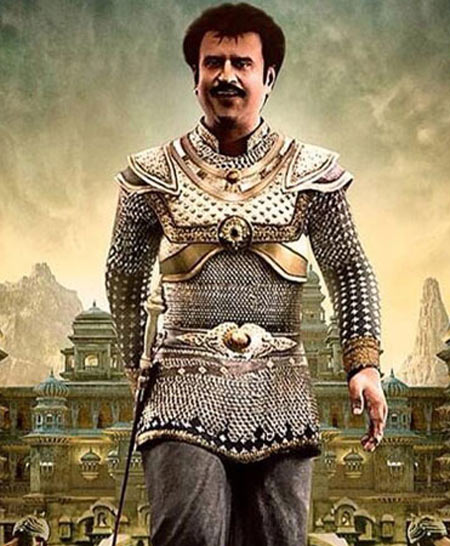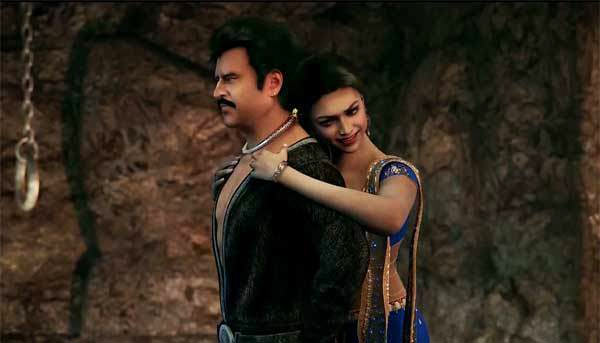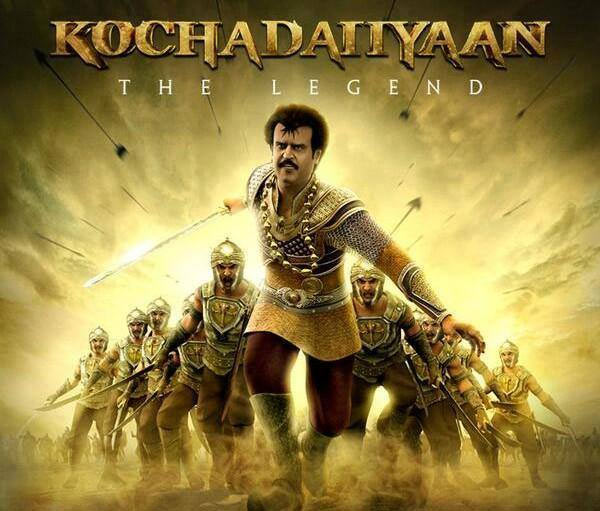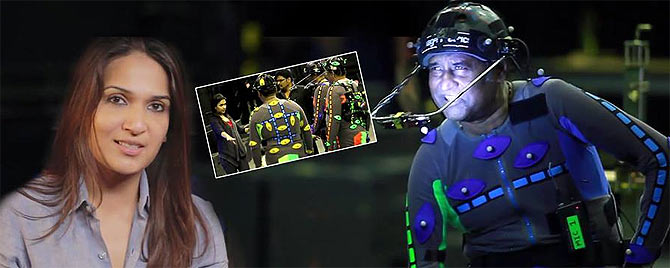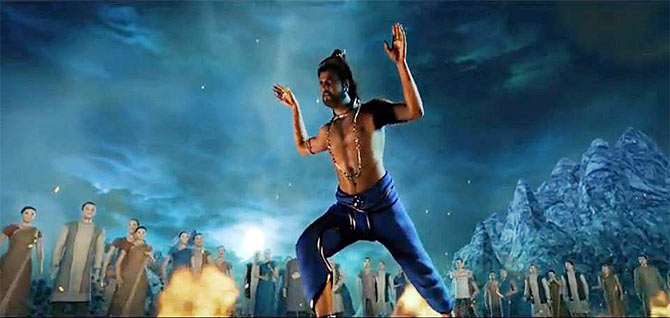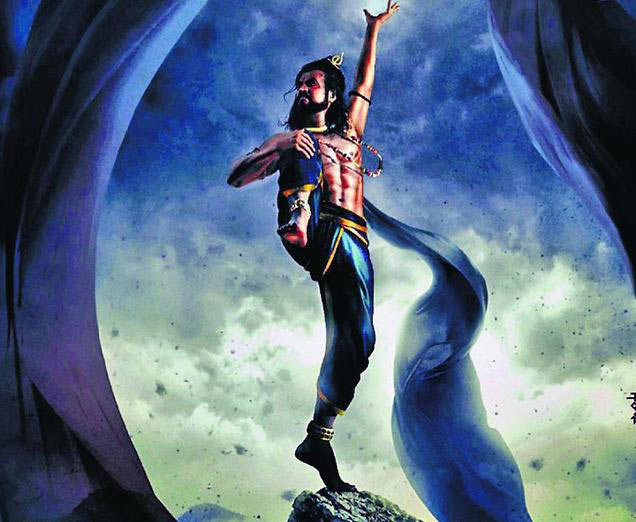 | « Back to article | Print this article |
'Rajinikanth was so humble and unassuming'
Superstar Rajinikanth's much-awaited Kochadaiiyaan has been the talk of the nation since it was officially announced over two years ago.
The film was born out of Rajini's desire to work in a film based on folklore, replete with accounts of kings and queens.
What began as an ordinary 3D animation film titled Sultan-The Warrior, exploded into this mega-budget film using cutting-edge digital filmmaking technology.
Kochadaiiyaan may or may not be India’s answer to James Cameron’s Avatar, but it is India's first photo-realistic 3D animation film using performance capture technology.
Written by K S Ravikumar, the film is directed by the superstar's daughter, Soundarya R Ashwin.
The Kochadaiiyaan team also boasts of two Oscar winners, the 'Mozart of Madras', A R Rahman, and sound engineer Resul Pookutty.
Deepika Padukone plays the female lead opposite Rajinikanth.
The film also has other top names: R Sarathkumar, Aadhi, Shobana, Rukmini Vijayakumar, Jackie Shroff, and Nassar.
Centroid Motion Capture, a world-renowned leader in motion capture technology, and the company that worked on Kochadaiiyaan, recently tied up with Chennai based PixelKraft to launch its Indian arm, Centroid India.
Its highly commendable portfolio includes movies such as Hugo, 2012, Quantum of Solace, Harry Potter and Pirates of the Caribbean.
 Rediff.com took this opportunity to meet with Phil Stilgoe, the founder of Centroid, who was in the city a few days ago, to get the lowdown on the making of Kochadaiiyaan at the famous Pinewood Studios in London.
Rediff.com took this opportunity to meet with Phil Stilgoe, the founder of Centroid, who was in the city a few days ago, to get the lowdown on the making of Kochadaiiyaan at the famous Pinewood Studios in London.
Winning the bid to work on Kochadaiiyaan
I am so pleased that a company like Centroid won the initial bid to be involved with Kochadaiiyaan.
At that time we had no idea that Kochadaiiyaan was going to be so huge and Centroid pitched like they do for any other job.
The production company behind Kochadaiiyaan, Mediaone, was keen to use a company that was already established with full performance pipelines.
We also have a relationship with a company called Faceware, and it was Centroid and Faceware together that provided the full performance solution for Kochadaiiyaan.
'It was a fantastic experience to work on Kochadiiyaan'
On working with an Indian production crew
In the run-up to the shoot, I was very nervous because the organisation wasn't what I was used to.
In the West, we are used to everything being screwed so tight you can barely move or breathe until you get going.
I think it was only the Saturday or Sunday before the shoot that Sandy (Soundarya) came in with some of the production crew and we sat and spoke about what we were going to do.
But once we began work and everything came together, we had lots of fun. It was a fantastic experience.
It felt like a very level playing field. They had not done MoCap before and we had not worked with an Indian film production crew before.
We were all sort of in it together, learning together. And I think this very positive vibe went through the whole shoot.
In a way, these are things that made me very keen to come to India and to learn more about filmmaking here.
Hopefully, MoCap will have some influence in what I believe is going to be a huge future.
'Rajinikanth never gave the impression that he was this demigod of Indian cinema'
On meeting Rajinikanth
It was the first day of the shoot, a Monday morning, that we actually met the actors who would be working in the film. I knew nothing about them except that these were the guys who would be working with us.
By about the afternoon of that day, a few things had gone off on Twitter about this famous guy being at Pinewood Studios and we had about eight forced deliveries turn up.
That got us thinking: who is this guy we are working with here? So we started looking and only then realised this was a mega star we had in our midst.
It was nice because the shoot was already on and Rajini was so humble, so unassuming. I have worked with actors of a far lower status, who have been quite hard to work with.
Also, he didn't just shoot and go away; he would hang out in the green room, always making time for a quick chat. He never ever gave the impression that he was this demigod of Indian cinema.
'Soundarya is going to be a big star, a pioneer in film making'
On debutante director, Soundarya R Ashwin
Sandy was fantastic to work with. She hadn't worked with this technology before, but watching her work, one would have never guessed that.
She embraced this technology, embraced the way we said we could work with MoCap, the props we could build, just about everything.
I think this is just the beginning for Sandy. She is going to be a big star, a pioneer, with this type of technology and in filmmaking as well.
On Motion Capture Technology
MoCap is about creating a digital double of someone's movement, their performance. You can say that you are taking the energy of the performance and putting it into a computer-generated character. It is all about capturing the nuance of someone's performance.
For example, Rajinikanth has some signature ways of performing and acting. MoCap is a brilliant way of being able to capture its energy and create a representation of that performance.
MoCap in many ways is no different from shooting for a live action camera with a director. They may feel that they are moving into something completely new, but at the end of the day, it is all about performance, it is all about the director getting what he wants from his actors.
MoCap is just an animated way of achieving that.
'Indian performance, especially dance has so much energy'
On the contribution of the artist in MoCap
Without the performer, MoCap is just a bunch of cameras and some very tight revealing lycra suits.
We calibrate our systems to a tenth of a millimetre with its accuracy, so any kind of movement in the performance, our cameras pick it up.
MoCap is just a very, very accurate way of recording human movement. If you haven't got a good performance, you have not got good animation. You need to have a team of people working on it.
Performance and direction is still the key to MoCap - that does not change.
Indian performance, especially dance has so much energy; there is so much happening with the eye. In the West, we are sterner, so it is almost like not acting.
Watching some of the dance performances, it is absolutely incredible how much of co-ordination goes into the facial movement, as well as the hand and the rest of the body. It was a full performance.
For me, this was brilliant, having this kind of performance and this kind of technology work together in total harmony.
On the use of technical performers in MoCap
We do have technical performers. Say, we are making a game and you have a superhero who can fly, dance and can fight off ten bad guys at the same time. You can't always get that from one person.
In the same way that when you shoot live action, you are not going to have your superstar jumping and doing the stunts - somebody else comes in.
MoCap is exactly the same; sometimes you need more than one person to actually create this whole character.
In some ways, it makes it safer for doing stunts. People don't literally have to jump off buildings any more or set themselves on fire and things like that. All that can be achieved in a safer, much more controlled environment.
'Not everyone is going to like Kochadaiiyaan'
On his expectations from Kochadaiiyaan
It is different, it is new and not everyone is going to like it. I work in an industry that has been criticised so much that I don't even notice it any more. I only notice the compliments; it is much easier.
Anything with change, there are always going to be some people who don't like it. But people not liking it will still help the technology progress. You won't move forward if everyone goes ‘Yes’ all the time, you need to have opinions and that is probably how India will make its mark.
In my opinion people disagreeing is never a bad thing as long as it stays passive. It evokes debate, what is right about it, what went wrong, and what we should do about it.
We need people to do that; otherwise we would still be working in black and white with no audio.
I always say don't dismiss everything you don't understand. Change is progression.
I think it is brave that someone like Rajinikanth decided that he was going to make a completely different film. He could have continued to make films that would have kept everyone happy.
Siddharth Kumar, director and creative head of PixelKraft, commends the breakthrough that Kochadaiiyaan is trying to make, and is excited at the future of this technology.
The West was not afraid of putting up a Polar Express, whereas we are so afraid of putting up a Kochadaiiyaan, wondering how people would react.
I think we need to be bold enough to experiment. Kochadaiiyaan is pretty daring. Rajinikanth could easily have done the next Padayappa and kept everyone happy.
He could have played it safe, but he chose to make a Kochadaiiyaan. And it is important that we look at it that way because what he is saying is here is a new technology and I am not afraid to try it.
Someone has to start it, so why not a superstar like Rajinikanth?
The right question to be asking now is what next?
Kochadaiiyaan is just the beginning. MoCap offers just one part of the entire pipeline. A whole lot of other technologies fall into this pipeline and Kochadaiiyaan seems like the right time to talk about it.
For good or for bad, people are talking now, they are more receptive. People want to understand, so now we can talk about concepts like virtual world, props, digi-doubles, virtual shooting etc. If I spoke about these concepts a year ago, no one would have been interested.
Partnering with Centroid, PixelKraft Studios have plans to create new styles of movies that will be visually stunning and explore genres that were not economically viable before.
Today, Rajini and his Kochadaiiyaan have made this possible.
